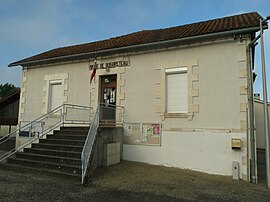Boisbreteau
Boisbreteau | |
|---|---|
 Town hall | |
| Coordinates: 45°19′27″N 0°09′03″W / 45.3242°N 0.1508°W | |
| Country | France |
| Region | Nouvelle-Aquitaine |
| Department | Charente |
| Arrondissement | Cognac |
| Canton | Charente-Sud |
| Government | |
| • Mayor (2020–2026) | Gaël Tétoin[1] |
Area 1 | 15.16 km2 (5.85 sq mi) |
| Population (2022)[2] | 128 |
| • Density | 8.4/km2 (22/sq mi) |
| Time zone | UTC+01:00 (CET) |
| • Summer (DST) | UTC+02:00 (CEST) |
| INSEE/Postal code | 16048 /16480 |
| Elevation | 79–157 m (259–515 ft) (avg. 150 m or 490 ft) |
| 1 French Land Register data, which excludes lakes, ponds, glaciers > 1 km2 (0.386 sq mi or 247 acres) and river estuaries. | |
Boisbreteau (French pronunciation: [bwabʁəto]) is a commune in the Charente department in southwestern France.
History
[edit]The first church was built prior to Boisbreteau 9th century, destroyed in the 14th century, repaired in the 15th century and banned in 1784 on the eve of the Revolution.
A priory was built in the 13th century. The foundation of the priory of Cluniac Notre Dame Boisbreteau date is unknown but a licensee Wilelmus mentioned in 1270.
While the Hundred Years' War ravaged the kingdom of France since 1337 and especially since the English naval victory at Sluys in 1340, from the late 14th century, the priory of Cluniac finds himself ruined by the English and was purely and simply deleted. It was at this time that the parish became part of Boisbreteau priory of Saint-Vivien Saintes.
The research has assumed that the Priory was probably the site of the present church of St. Macrina.
In the 15th century the land belonged to the family Boibreteau Frondebœuf until marriage to Isabella of Frondebœuf Curzay with John, Lord of Parsay July 18, 1491 and is still by marriage they spent in 1609 to Bring the family The Wolf and the Rocquart, then to the Stone-Saulnier Closure lords Rouillac, Gondeville Sonneville Boisbreteau, and other places.
Population
[edit]| Year | Pop. | ±% p.a. |
|---|---|---|
| 1968 | 182 | — |
| 1975 | 174 | −0.64% |
| 1982 | 153 | −1.82% |
| 1990 | 148 | −0.41% |
| 1999 | 122 | −2.12% |
| 2009 | 124 | +0.16% |
| 2014 | 135 | +1.71% |
| 2020 | 127 | −1.01% |
| Source: INSEE[3] | ||
See also
[edit]References
[edit]- ^ "Répertoire national des élus: les maires" (in French). data.gouv.fr, Plateforme ouverte des données publiques françaises. 13 September 2022.
- ^ "Populations de référence 2022" (in French). The National Institute of Statistics and Economic Studies. 19 December 2024.
- ^ Population en historique depuis 1968, INSEE



